

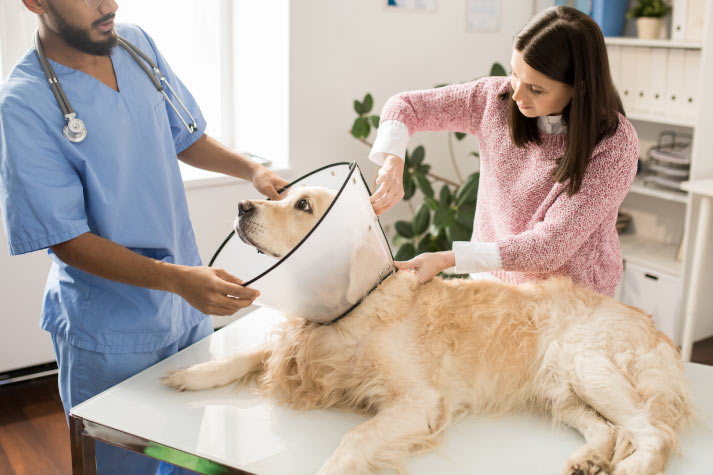
18 Sep
Dogs are beloved companions that bring unconditional love and joy to our lives. As responsible pet parents, it's essential to be aware of common dog diseases, their symptoms, and the importance of early treatment. Understanding these diseases and seeking timely veterinary care can significantly impact your dog’s health and quality of life and prevent serious health problems.
In this handy guide, we’ll explore several prevalent canine illnesses, their signs, and treatment options, helping dog owners recognize potential issues early and take appropriate action
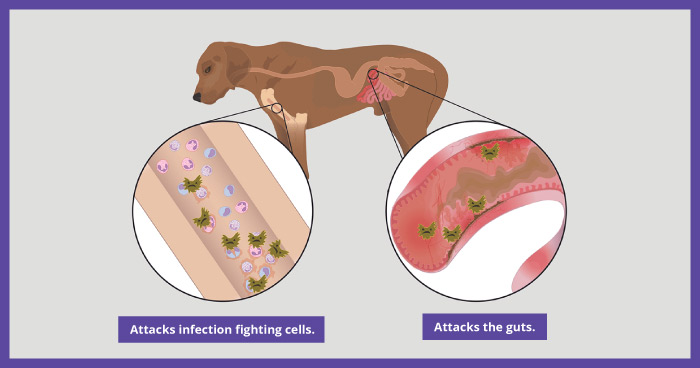
Parvovirus is a highly contagious viral infection that primarily affects puppies and unvaccinated dogs. It targets the gastrointestinal tract, causing to severe damage which can be fatal if left untreated.
Symptoms: Severe diarrhoea, vomiting, lethargy, loss of appetite, dehydration
Treatment: Parvovirus requires veterinary care, including fluid therapy, medication to control vomiting and diarrhoea, and, in some cases, antibiotics to treat secondary infections. Vaccination is the best preventive measure, highlighting the importance of regular vet visits.
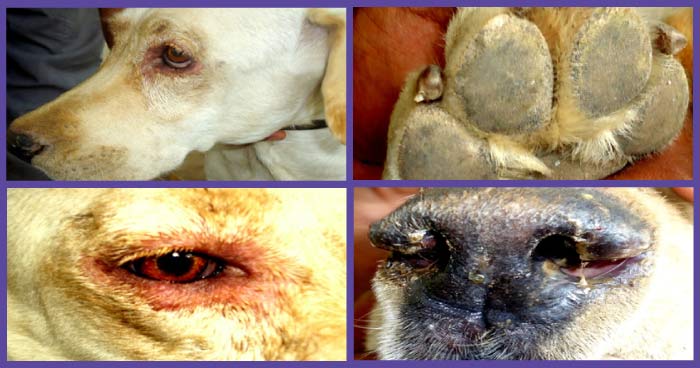
Canine distemper is a viral disease that affects a dog’s respiratory, gastrointestinal, and nervous systems. It is especially dangerous for puppies and can be fatal in some cases.
Symptoms: Coughing, sneezing, nasal discharge, fever, lethargy, neurological signs (such as twitching or seizures)
Treatment: There is no cure for canine distemper, making vaccination critical. Treatment focuses on supportive care, such as fluids and medications to manage symptoms. Despite treatment, distemper has a high mortality rate, underscoring the need for prevention.

Lyme disease is caused by bacteria transmitted through tick bites. If left untreated, it can lead to joint problems, kidney issues, and heart or nervous system complications.
Symptoms: Fever, lameness, swollen joints, lethargy, loss of appetite
Treatment: Lyme disease is treated with antibiotics, with early intervention offering the best chance of full recovery. Tick prevention, including regular checks after outdoor activities and prompt removal of ticks, is essential to reduce the risk.
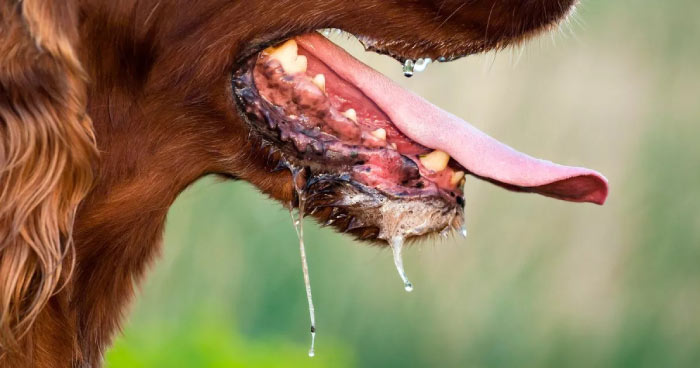
Rabies is a viral disease that affects the central nervous system. It is transmitted through the bite or saliva of infected animals and can be transmitted to humans. Once symptoms appear, rabies is almost always fatal, making it one of the most severe diseases.
Symptoms: Behavioural changes, aggression, excessive salivation, difficulty swallowing, paralysis
Treatment: There is no treatment for rabies once symptoms are visible, making vaccination the only effective method of prevention. If your dog is exposed to a potentially rabid animal, immediate veterinary care is critical.

Also known as infectious bronchitis, kennel cough is caused by bacteria and viruses. It is among the most common diseases in dogs, with obvious symptoms including a forced cough which sounds like your dog has something stuck in their throat or congestion. It is commonly spread in places where dogs gather, such as kennels, parks, and grooming salons.
Symptoms: Persistent cough, sneezing, nasal discharge
Treatment: Treatment varies depending on the severity of the infection but usually includes rest, hydration, and sometimes antibiotics if bacteria are involved. Cough suppressants may be prescribed to alleviate discomfort, though coughing helps clear the respiratory tract. Vaccination against kennel cough can reduce the risk or severity of the illness.
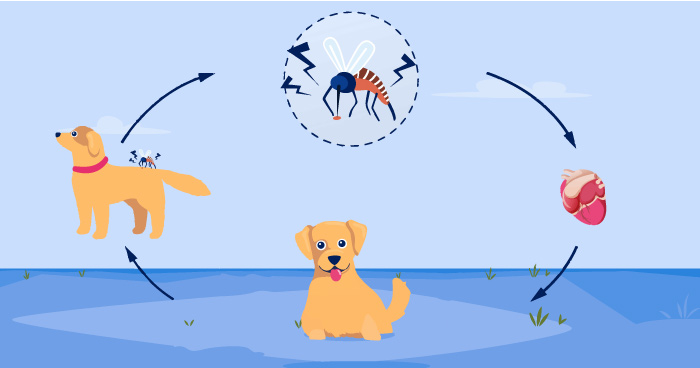
Heartworm disease is transmitted through mosquito bites and affects the heart and lungs. If left untreated, heartworms can grow and multiply, leading to severe damage to these organs and potentially causing death.
Symptoms: Coughing, lethargy, exercise intolerance, weight loss
Treatment: Treatment is complex and may include medications to kill the worms, hospitalization, and ongoing care to manage the disease. Prevention is key, with monthly medications recommended in areas where mosquitoes are common.
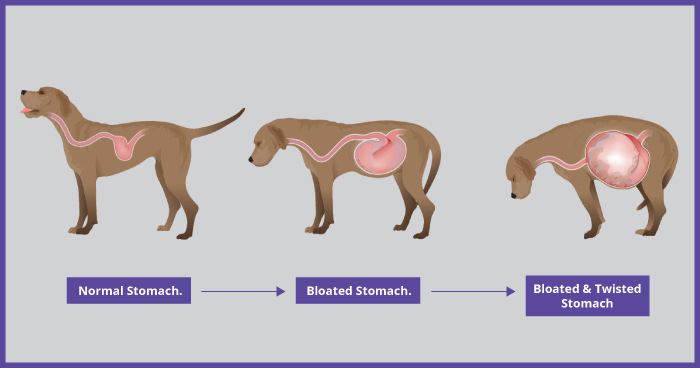
Bloat occurs when a dog’s stomach fills with gas and twists on itself, cutting off blood flow and leading to life-threatening complications. It is more common in deep-chested breeds.
Symptoms: Swollen abdomen, restlessness, unproductive vomiting, difficulty breathing
Treatment: Bloat requires emergency surgery to correct the twisted stomach and relieve pressure. Prompt veterinary intervention is essential to save the dog’s life.

Dogs can develop allergies to various substances, including food, pollen, dust, and certain materials. Allergic reactions can manifest as skin irritation, ear infections, or digestive issues.
Symptoms: Itching, redness, inflammation, ear infections, gastrointestinal upset
Treatment: Treatment depends on the type of allergy and may include dietary changes, antihistamines, or other medications to manage symptoms. Identifying and avoiding triggers is also crucial for long-term management.
While understanding the symptoms and treatments of common dog diseases is essential, prevention is the best approach. Regular veterinary check-ups, vaccinations, and preventive measures, such as flea and tick control, can significantly reduce your dog’s risk of developing many of these conditions. If you notice unusual symptoms or behaviour in your dog, seeking prompt veterinary attention is vital for proper diagnosis and treatment. Early detection often leads to better outcomes, making it crucial to stay vigilant about your dog’s health.
Recognizing the signs of common dog diseases and seeking timely treatment are essential aspects of responsible pet ownership. This guide has outlined the symptoms and treatment options for several prevalent canine illnesses, but prevention through vaccinations, regular vet visits, and preventive care remains the most effective way to ensure your dog stays healthy. Always consult with your veterinarian for advice tailored to your dog’s specific needs.

AUTHOR’S BIO
ARSH BHARDWAJ
I am passionate about language, storytelling and the human urge to connect Having paid close attention to marketing and branding as a craft for some time, I'm eager as ever to indulge my passion for prose.